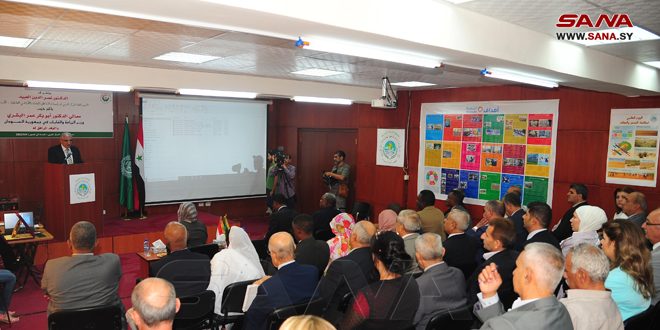On September 4th, Director-General of ACSAD Dr. Nasr El-Din El-Obeid met with a Sudanese technical delegation headed by the Undersecretary of Agriculture and Forestry Badr El-Din El-Sheikh Mohamed El-Hassan at the center’s headquarters in Damascus.
The two sides discussed the existing cooperation and ways to develop it and the Sudan Food Security Initiative and ACSAD’s contribution to supporting this initiative and benefiting from its experiences and research in a way that supports the efforts of the Sudanese Ministry of Agriculture and Forests in sustainable development.
In a statement to reporters, Al-Obeid affirmed ACSAD’s readiness to put all its capabilities and expertise in the service of the programs and projects of the Sudanese Ministry of Agriculture and Forestry in order to meet its aspirations and future plans for the development of the agricultural sector.
He pointed out that ACSAD is currently implementing in Sudan the third phase of the optimal land use map project, which includes 13 million hectares in the states of Blue Nile, White Nile and Gezira, after the first and second phases were implemented and amounted to 103 million hectares.
Al-Obeid pointed out that there are 9 million hectares capable of cultivating wheat in Sudan, and this area, if planted with oxidized wheat varieties according to the methodology and mechanism of the center, would produce more than 40 million tons of wheat, thus reducing the grain import gap in the Arab countries, especially in light of the high freight and transportation prices.
For his part, Minister Plenipotentiary and Chargé d’Affairs at the Sudanese Embassy in Damascus, Tariq Abdullah Al-Tom, explained that the declaration of a state of emergency in Sudan due to the floods prevented the Sudanese Minister of Agriculture and Forestry from coming.
Dr. Fatima Mohamed Rahma, Director General of International Relations at the Sudanese Ministry of Agriculture and Forests, praised ACSAD’s distinguished efforts in Sudan and relations with Syria, wishing for continued fruitful and constructive cooperation at the bilateral and multilateral levels and for coordinating efforts in all international, regional and national forums.
O. al-Mohammad

